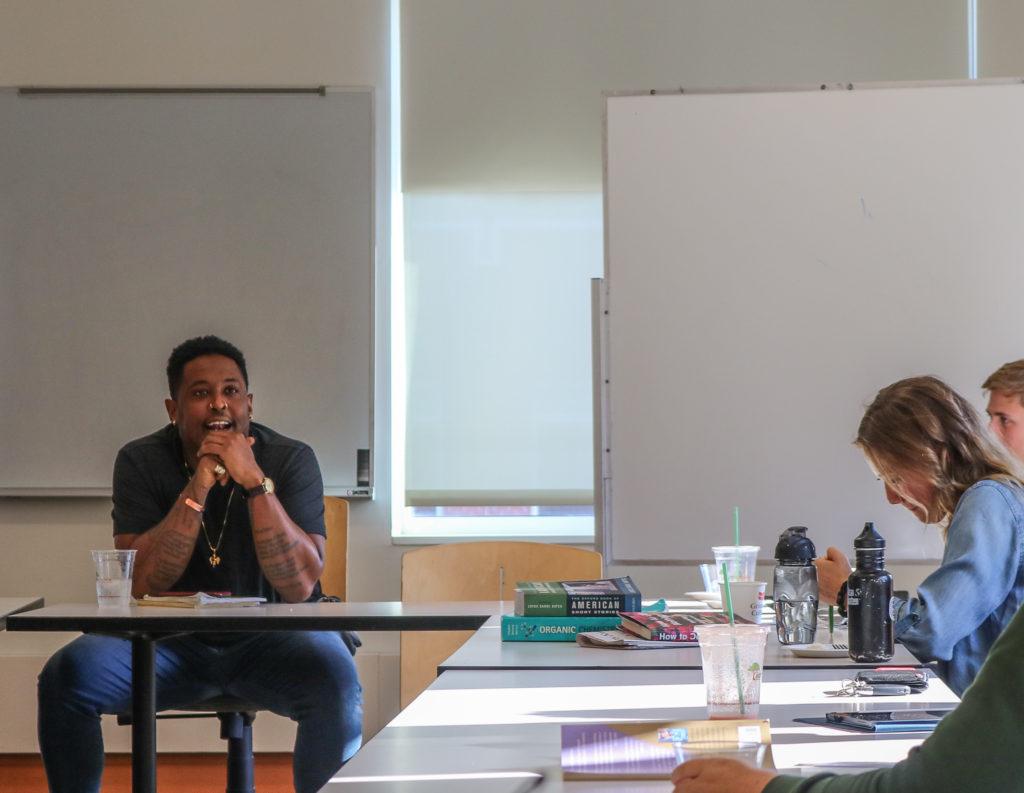Danez Smith stunned students, faculty, and community members alike at their roundtable and reading this past Tuesday, September 3rd, hosted by Writers@Grinnell. Danez Smith is an accomplished writer and poet from St. Paul, Minnesota.
Their work has won many awards and has been featured on platforms such as Buzzfeed, the New York Times, The Late Show with Stephen Colbert, and many more. Smith electrifies the spaces they occupy through hilarious commentary as well as deeply touching performances. Their poems span a range of topics, from existing as a black queer person, to gun violence and police brutality.
Smith explained that they found their voice when they started to write about subject matters that were deeply personal to them at the age of 21, even though they had been writing poetry since they were 14 years old. They participated in theater in high school and were encouraged by their teachers, who saw their talent early on to continue doing performance art.
Smith grew to perform their poetry visually through spoken word, and graced Grinnell with thrilling performances from their poetry books, “Don’t Call Us Dead” and “[insert] boy.” They also performed an unreleased poem from their poetry book “homie,” available January 2020.
The roundtable was filled with about 20 students, who watched Smith intently as the poet performed some of their pieces before the floor was opened for questions. As soon as everyone settled in, Smith exclaimed at the lack of water at the event, making the room laugh and, in the process, breaking the ice and introducing the students to their charismatic and down-to-earth personality.
They also performed a poem called “dogs!” which required participation from the attendees. Every time that Smith pointed at the room as a queue, the students would have to bark. Later, at the reading in Hotel Grinnell, Smith gave the audience a choice between this same poem or “a note on Vaseline to my 13-year-old self,” self-described as “a poem about masturbation.” Through resounding cheers, the crowd chose the latter, and Smith heeded the room’s request.
Every poem was performed with an electric feeling coursing through the crowd, so powerful that it unified the audience members. Whether it be through somber nods as Smith performed “summer somewhere,” through tears as they performed “acknowledgments,” or through laughs and cheers, the audience was very much part of the performance.
Smith answered all of the questions that were posed at the events sincerely, asking if there was time for a couple more questions at both. Some general words of advice that they gave during the Q&As were, “not to divorce joy from suffering,” to “[embrace] your fear, [write] about the things you’re afraid of,” and that poetry should be about “making ourselves immortal, not inaccessible.” They pointed this last piece of advice at scholars who think work that is more difficult to understand is innately better.
Their two poetry books “Don’t Call Us Dead” and “[insert] boy” were sold outside the venue. After the reading and Q&A, there was a book signing where Smith happily took pictures with students and answered more questions.
The reading concluded in a final question from the crowd, in reference to one of Smith’s earlier poems.
“Will you be my president?”
The room erupted with cheers and laughter that Smith silenced with their response.
“No. I’d very much like to be somebody’s first lady though!”























































